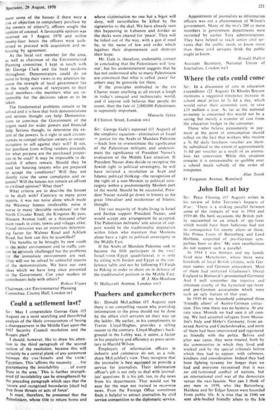Could a settlement last?
Sir: May I congratulate George Gale (15 August) on a most searching and thoughtful analysis of the likely consequences of basing a disengagement in the Middle East upon the 1967 Security Council resolution and the Rogers plan?
I should, however, like to draw his atten- tion to the third paragraph of the second section of the resolution, because this will certainly be a central plank of any agreement between the usa /Israelis and the USSR/ Egyptians. This 'affirms the necessity ... for guaranteeing the inviolability . . . of every. State in the area.' This is further strength- ened (if inviolability can be strengthened) by the preceding paragraph which says that the secure and recognised boundaries [shall be] free from threats or acts of force'.
It must, therefore, be presumed that the Palestinians, whose title to return home and whose victimisation no one but a bigot will deny, will nevertheless be killed by the signatories to the deal. We have already seen this happening in Lebanon and Jordan as the decks were cleared for 'peace'. They will be tidied out of the way, with a gun if need be, in the name of law and order which legalises their dispossession and destroys their hope.
Mr. Gale is, therefore, undeniably correct in concluding that the Palestinians will 'lose out', but his understatement suggests that he has not understood why so many Palestinians are convinced that what is called 'peace' for others may be genocide for them.
If the principles embodied in the UN Charter mean anything at all except a laugh in today's unequal and technocratic world, and if anyone still believes that people do count, then the fate of 2,000,000 Palestinians is supremely important.
Manuela Sykes 8 Chinton Street, London swl
Sir: George Gale's espousal (15 August) of the simplistic equation—elimination of Israel = justice for the Arabs of Mandate Palestine —leads him to overestimate the significance of the Palestinian militants and underesti- mate the significance of President Nasser's evaluation of the Middle East situation. If President Nasser does decide to recognise the Jewish right to political sovereignty, he will have initiated a revolution in Arab and Islamic political thinking—the recognition of the right of a non-Moslem to political sove- reignty within a predominantly Moslem part of the world. Should he be successful, Presi- dent Nasser would go down in history as the great liberaliser and moderniser of Islamic thought.
The vast majority of Arabs living in Israel and Jordan support President Nasser, and would accept any arrangement he accepted. The Palestinian militants' sole source of sup- port would be the traditionalist dogmatists within Islam who maintain that Moslems alone have a right to political sovereignty in the Middle East.
If the Arabs of Mandate Palestine seek to become the fifth participant in the USA Israel/ussa /Egypt quadrilateral, it is only by sitting with Jordan and Egypt at the con- ference table and not by following El-Fatah to Peking in order to shoot on in defence of the traditionalist position in the Middle East. H.I.MarMoolson 51 Hollycroft Avenue, London Nw3






























 Previous page
Previous page